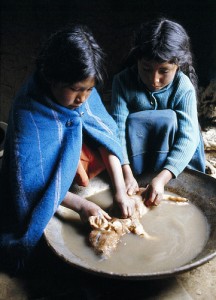In Bolivia, where unions are extensively formed by members of society, another group of workers have unionized: children.
A story on child labor in Bolivia is presented by Jean-Friedman Rudovsky as part of a series Ground Shifters: Stories of Women Changing Unseen Worlds. Rudovsky writes:
Bolivia has 9 million inhabitants; one million are child workers, some who started working as early as seven. Of these, almost half are girls. The girls, like their jobs, are often hidden, inside homes or in the backs of restaurants.
Mauricio Aira in the blog Bolivia Primera Plana [es] argues that child labor is not a concern for Bolivian society, and adds:
el anonimato en el que viven [los niños trabajadores] simplemente refleja el desprecio que siente el mundo adulto por la niñez en Bolivia.
Hispanically Speaking News previously reported:
These children and adolescents work to help the family, to support themselves in their studies, to provide for their personal expenses, to secure themselves a better future compared to their fathers and brothers buried by silicosis and accidents in mines or plantations of sugar cane.
The majority of child workers attend school while keeping up with demanding jobs, some even working full-time hours. They have formed unions to be protected by the government and treated respectfully by society. As Marion Gibney writes:
these children do not view their situation as a bad one; they want to work, and formed these unions for their own benefit. The unions are meant to grant them protection and basic rights from the government, as well as to gain respect from others in the work force. Being children, they are often picked on and beat up by grown-ups, but they have learned to adapt and protect themselves.
Since child labor is outlawed, it is difficult to ask the government or other organizations for protection of child labor. Noemi Gutierrez, a young coordinator for CONNATSOP, the Potosi Council of Organized Child Workers says:
“Everyone says that kids shouldn’t work, but they are not taking into account the economic reality in this country. Sure, if we were all well off, none of us would have to work. But rather than thinking rationally, the government only says we need to eradicate child labor. I say, they ought to eradicate poverty first.”
The blog Children's Participation summarizes some of the demands made by UNATSBO (“Unión de Niños, Niñas, y Adolescentes Trabajadores de Bolivia” in Spanish, or “Union of boys, girls and teen workers of Bolivia” in English) the country's largest union of child workers:
They want to ensure that children earn the same wages and have the same financial tools as their adult counterparts. In some sectors, they earn less than half the salary of their adult colleagues. Moreover, children don't have access to savings accounts and often give their earnings directly to their parents. Union members also lobby for safe work environments and for better medical care, especially for children whose jobs present a health risk.
The lack of recognition of children who work forms one of the major obstacles in achieving better living conditions for working children








4 comments